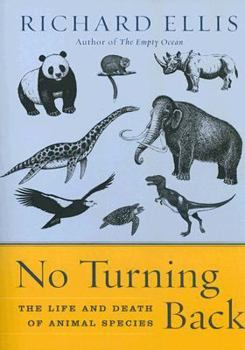No Turning Back: The Life and Death of Animal Species
Select Format
Select Condition 
Book Overview
A noted naturalist's fascinating inquiry into the life and death of animal species Just about every species that has ever lived on earth is extinct. The trilobites, which dominated the ocean floors... This description may be from another edition of this product.
Format:Paperback
Language:English
ISBN:0060558040
ISBN13:9780060558048
Release Date:August 2005
Publisher:Harper Perennial
Length:428 Pages
Weight:0.90 lbs.
Dimensions:1.1" x 5.2" x 8.1"
Customer Reviews
2 ratings
Nutty Morons Aside...
Published by Thriftbooks.com User , 15 years ago
After reading the review from the raving egotist who gave the book one star simply because Mr. Ellis doesn't think he's as smart as his mom told him he is I thought that I should write one too, but I'll keep it short. If you are interested in nature, science, etc. and are looking for an engaging, casual book to spend some time with you'll learn a lot from this one. The book is written for the Average Joe and is in Average Joe language, so if you believe that you're the guy Einstein stole all his ideas from you might find the book too simplistic, but if you're a normal person who likes reading about science the book will keep you entertained. Oh and watch out for Steve Alten. He's apparently been getting into dad's special Kool-Aid again.
Crying wolf
Published by Thriftbooks.com User , 19 years ago
"No Turning Back" is a hybrid of several other books on the subject that I have read: "Extinction-Evolution and the end of man" by Michael Boulter, "The Sixth Extinction" by Richard Leakey, and "Song of the Dodo" by David Quammen. Interestingly enough, the blurbs on the back cover are for other books written by Ellis, not this one. His thirteen or so previous books all dealt with sea life. Ellis is an excellent writer. This book is well-researched and full of interesting facts. You would think that I would know a thing or two about extinction judging from the books I have read on the subject but I learned a lot from this one. For example, hyperdisease is a disease capable of wiping out an entire species. Irrevocable evidence of just such a disease has been found in the most recent bones of Mastodons. It is assumed by the timing of the epidemic to have been spread by people and their dogs. We may be witnessing the same thing with the frogs of the world. I do not want to give too much of the book away, but you can count on seeing lots of good tidbits like this. Anything a lay person would want to know about the topic of extinction in general is covered. He also talks about species that have been brought back from the brink, the probability of resurrecting extinct species, and new species that have been discovered. If you do not already know much about extinction, this book will be fascinating. Personally, I am less interested in ancient extinction events than in finding solutions to halt the one currently in progress. Ellis finishes his book with the standard ominous suggestion that humanity may be positioning itself for extinction. This warning bell has been ringing out since 1962 when Rachel Carson wrote "Silent Spring." You would think (as we head for the half-century mark for her book) that the concept would have taken hold, but it hasn't, strongly suggesting that it never will. The wolf may be coming, but the warning has lost its effect over time. The debate over using DDT is raging all over again. Missing from the book, as with most other books like it, are innovative suggestions for how to end this event. It has been estimated that for about 28 billion dollars enough critical habitat could be bought or leased to protect 70 percent of the known plant and animal species in the world. Our current attempt to establish a democracy in Iraq has already cost us five times that much. Such is human nature. It is also human nature to form into groups complete with a geographic boundary and a label. These boundaries are called countries. All through history, in times of war, the areas adjacent to the warring parties widen into what is called a no man's land. Given time, these off limits areas are taken back by nature. This has happened in the no man's land between the two Koreas and it is an excellent example of what happens when human beings are kept out, in this case, by warring factions. No one goes hungry in South Korea just because that p






